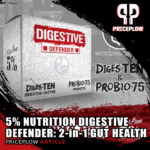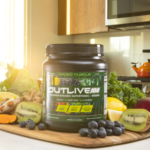Apple Cider Vinegar (Tag Archives)
Subscribe to PricePlow's Newsletter and Apple Cider Vinegar Alerts
GR8 Lifestyle ACTIV8: The Gut Health Greens Powder Made with Organic Superfoods

Looking for a greens powder that does much more than just superfoods?
ACTIV8 is one of the first five innovative formulas from GR8 Lifestyle Supplements that elevates the greens powder category by combining premium organic superfoods with targeted gut health and immune support ingredients. It's a comprehensive wellness complex designed to support your body from […]
Continue Reading →
Life Cider X: Apple Cider Vinegar Meets Clean Energy with enfinity® Paraxanthine

Life Cider X combines the gut health benefits of a full-dose apple cider vinegar drink with the clean, focused energy of enfinity® paraxanthine. This innovative functional beverage gives ACV enthusiasts a smarter energy option while maintaining the core benefits of apple cider vinegar.
What is Life Cider X? A Full 15g Dose of ACV[…]Continue Reading →
Kaged Clean Burn (Original Powder): Strawberry Lemonade & Lemon Drop at The Vitamin Shoppe

The big news from the Kaged camp over the last few months has been the massive collaboration with GNC to bring the new Elite Series to consumers across the globe. We've been thoroughly impressed with the new-and-improved formulas to arise from the partnership thus far. Here are a few of the most exciting ones:
Now, […]
Continue Reading →
Kaged Clean Burn Elite: Boost Fat Loss with Apple Cider Vinegar and InnoSlim

The Kaged evolution continues, with promises of a big year coming to fruition thanks to Clean Burn Elite, an enhanced apple cider vinegar enhanced fat loss drink!
Ever since our June 2023 interview with Aaron Heidebreicht and Darin Decker of Kaged on Episode #097 of the PricePlow Podcast, we've been teasing the brand's […]
Continue Reading →
Clean Burn Powder: Kaged Enhances Fat Loss with Apple Cider Vinegar

The Kaged evolution continues, with promises of a big year coming to fruition thanks to Clean Burn Powder, a new apple cider vinegar enhanced fat loss drink!
Ever since our December interview with Michael McClane of Kaged on the PricePlow Podcast, where the brand's President announced a major rebranding effort to shift from Kaged […]
Continue Reading →
5% Nutrition Digestive Defender: A 2-in-1 Gut Health Supplement Kit

If you're gunning to be anywhere near the size of legendary bodybuilder and modern renaissance man Rich Piana, then you're going to need to eat a lot of food. An absurd amount - and have a training regimen to follow.
However, your body can't utilize what it can't absorb. Regardless of the Kill […]
Continue Reading →



